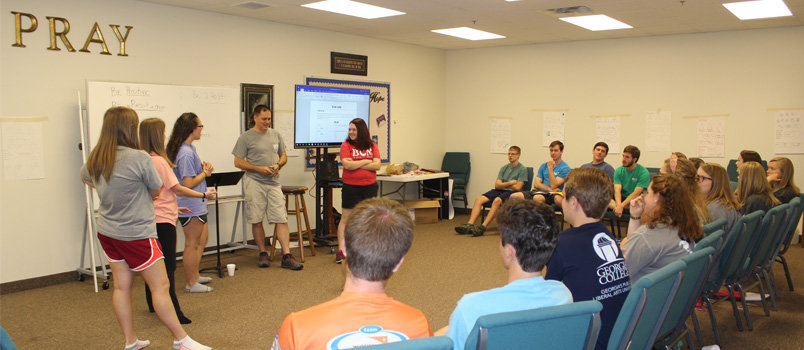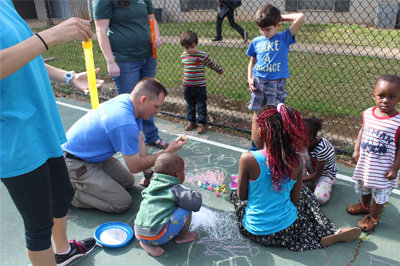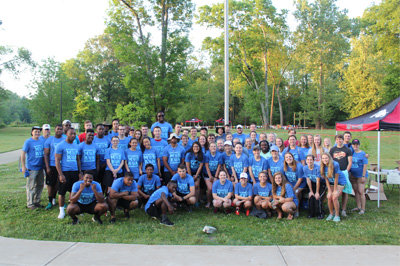 David Kirkland, center, leads the Baptist Collegiate Ministry at Georgia College & State University (GCSU) in Milledgeville. Kirkland teaches generosity to the collegians by using a variety of social learning styles. COLLEGIATE MINISTRIES/Special[/caption]
David Kirkland, center, leads the Baptist Collegiate Ministry at Georgia College & State University (GCSU) in Milledgeville. Kirkland teaches generosity to the collegians by using a variety of social learning styles. COLLEGIATE MINISTRIES/Special[/caption] Mark Twain is quoted as saying, “Some people get an education without going to college. The rest get it after they get out.”
Not all learning for college students is inside the classroom. Per the National Center for Educational Studies, over 20 million students are attending American colleges and universities this fall semester, so learning is important to our nation. With almost a hundred public and private institutions of higher education in Georgia, apparently, our state still values learning.
As a key element of discipleship, Kingdom Generosity is learned more with hands-on activity than in a classroom. In a recent interview with state missionary David Kirkland leading the Baptist Collegiate Ministry at Georgia College & State University (GCSU) in Milledgeville, Buck Burch discovered how generosity is being taught using social learning styles. Different people learn in different ways, and a social or interpersonal learning style requires events designed for human interaction to facilitate that learning.
Kirkland has served in collegiate ministry for about 20 years. He was discipled at North Georgia College by another campus minister, and after seminary he entered state missions as a college minister. Kirkland sees Kingdom Generosity as the act of “giving away of yourself, not just your money, time, and energy.” He believes that “God has called us to give our lives away for the sake of others.” He says, “It is our privilege to pass the Gospel along to others, and we have to be involved personally to get the Gospel message out.”
 Kirkland models learning during a missions activity. As a key element of discipleship, Kingdom Generosity is learned more with hands-on activity than in a classroom. COLLEGIATE MINISTRIES/Special
Kirkland models learning during a missions activity. As a key element of discipleship, Kingdom Generosity is learned more with hands-on activity than in a classroom. COLLEGIATE MINISTRIES/SpecialIn their book Why They Stay, authors Steve Parr and Tom Crites point out that the least likely ministry in church is one to college students. Parr notes that “the time we’re most likely to lose a child from church is when they’re in college. ... You’ll notice that most churches have a gap between high school and young marrieds, with no ministry to anyone in between.”
Yet the Baptist Collegiate Ministry (BCM) at GCSU is one of about 50 college campuses where the Georgia Baptist Mission Board has a ministry presence. As of last semester, there were over 4,000 students regularly and actively involved in BCMs across Georgia.
At GCSU, Kirkland teaches Kingdom Generosity to his college student leadership team, beginning on the first day of the semester. “On Tuesday nights,” he notes, “I train them to be spiritually minded to find the new people in the room. I tell them if you’re standing around and surrounded by your best friends, you’re in the wrong place. It should be about reaching out to others, being generous with your time, being generous with your energy.”
Because of that, Kirkland promotes ministry opportunities for his students to be involved socially. Locally, students regularly minister through a local pregnancy center or a nursing home. Bigger opportunities like Spring Break missions or summer mission trips abound. “Students raise money for missions and learn to give their time away. Sacrificially giving up a cup of coffee or soft drink to raise thousands of dollars to send students on mission trips makes a difference,” he notes.
According to Joe Graham, state missionary with the Georgia Baptist Mission Board for Collegiate Ministries, the statistics from last semester’s BCM ministry in Georgia are astounding. “College students in BCMs contributed about $220,000 to student mission work. Around 687 students were involved in BCM leadership development, and 892 were engaged in community missions and ministries,” he shared.
 Hands-on ministry results in a better grasp of learning and creates more interest in group mission service participation. COLLEGIATE MINISTRY/Special
Hands-on ministry results in a better grasp of learning and creates more interest in group mission service participation. COLLEGIATE MINISTRY/SpecialUsing the social learning style, Kirkland involves his students in experiences that require social interaction. Recently on a spring break, his BCM students engaged hikers on the Appalachia Trail to provide free bottles of water and hamburgers. They shared food with stories and rejoiced with opportunities to share the gospel.
Kirkland notices a change within the students when they interact with lost people and give them something. “It brings an excitement and an anticipation to do it again,” he said. “Generosity breeds generosity.”
Graham noted that during the last school year in Georgia, BCM students were able to lead over 1,600 people to Christ. “For every three to four students involved in BCM, somebody comes to Christ. Churches would love to have that ratio!”
With all of the influences for the college students’ minds, college campuses are both a battlefield and a mission field. College students leaving home for the first time are faced with making new decisions on their own: What kind of person am I going to be? Do I keep my former faith or not? Kirkland sees this as a critical time to intentionally help students manage “major league decisions.”
They need to answer not just what kind of career will I have or who will I marry, but “How will I spend my discretionary time? Am I going to believe the Bible here? Am I going to worship Jesus here? As a result Kirkland wants to raise up a generation of generous people, godly-minded people, Kingdom-minded young adults.
The audio podcast with this interview about Social Learning and Kingdom Generosity can be accessed freely here and scrolling down to "Episode Six."